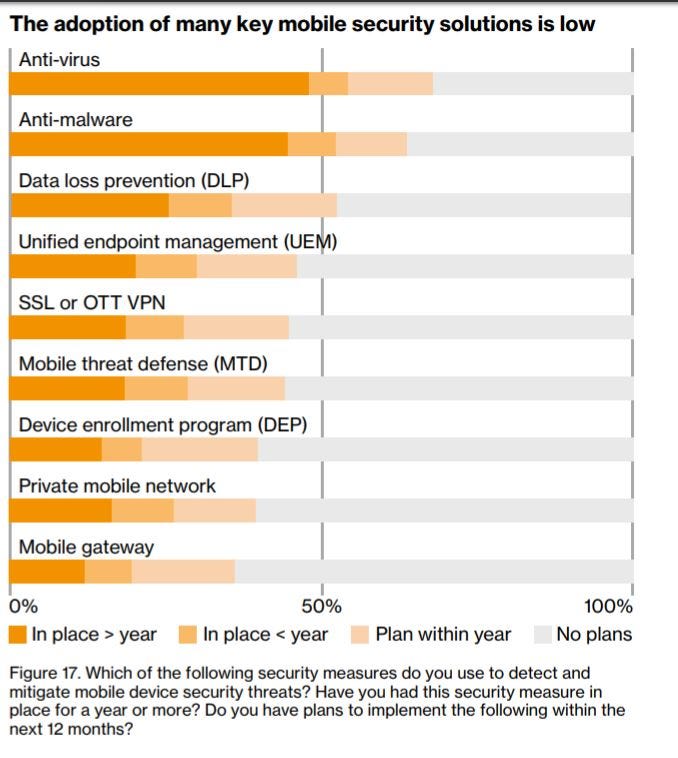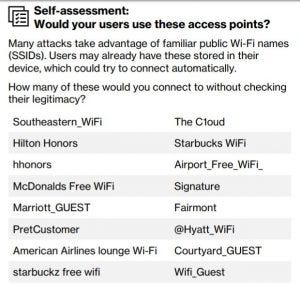Verizon Mobile Security Index Exposes Troubling Employee Wi-Fi Habits
We've got a long way to go, folks.

Businesses face increasing barriers to securing their employees’ mobile devices, whether they realize it or not.
Verizon’s second annual Mobile Security Index shows that mobile is one of the fastest growing security vulnerabilities for companies.
Almost all of the financial services companies in the survey – 93 percent – see mobile as the fastest growing source of threats, and professional services and education companies were only slightly less concerned, at 88 percent and 86 percent, respectively.
Indeed, a significant number of companies have already seen the threats actualized. One in three (33 percent) respondents admitted to security compromises that involved a mobile device. That is an increase from 27 percent last year.
Companies acknowledge some of their deficiencies. Two in three (67 percent) respondents said they lack confidence in their mobile security more than any other part of their technology. But their fears don’t line up well with their level of preparation.
Risky Sacrifices
Verizon’s study shows businesses prioritizing speed and profit over security, preferring to “get the job done” rather than eliminating threats.
While 32 percent of respondents for the 2018 index said they had sacrificed security, the number was 48 percent in the 2019 edition. The businesses that cut corners tended to become compromised, as attackers successfully infiltrated 46 percent of them. The businesses that hadn’t made sacrifices in the name of business expediency fared much better, as only 24 percent of those suffered a compromise.
Even the dedicated companies, however, have much ground to travel with regard to their security apparatus. The study found most organizations lacking in important mobile security tools. The chart below shows that more than half of the respondents have antivirus and anti-malware systems in place.

Source: Verizon Mobile Security Index
The numbers above represent minuscule improvement – if one could even call it improvement – over 2018 scores, in which 61 percent of respondents were using antivirus/malware for mobility. Just like in the 2018 survey, a significant chunk of 2019 respondents claimed they would implement new measures in the upcoming year.
“A comparison with last year’s stats suggests that this is more likely to be overconfidence,” the report wrote. “While they may hope, and even plan, to introduce additional protections, many will fail to do so.”
A Mobile Workforce

Source: Verizon Mobile Security Index
One statistic says that employees use an average of 12 Wi-Fi hotspots each day. A hotspot proved unsafe for 4 percent of devices each month in the survey. Some of those unsafe networks were what Verizon calls “rogue access points” that imitate real public Wi-Fi. The graphic to the right demonstrates how bad guys can easily bamboozle people into logging into their fake network.
Justin Blair, executive director of business products in Verizon’s global products and solutions organization, said we need to acknowledge that we now live in a mobile world where employees may frequent a Starbucks more often their company’s office space.
That of course does not preclude us from taking cautious measures as we go about our work untethered.
“If you want to be completely secure, go on LTE; stay off the Wi-Fi. But if Wi-Fi is a need, make sure you’re using …
… some kind of application that can help you manage that and is going to protect you from joining a Wi-Fi network that’s not secure,” Blair said. “Use encryption as much as possible, especially when you’re on a public network.”

Verizon’s Justin Blair
Blair said many companies lull themselves into a false sense security because they’ve bolstered on-site security. They feel impenetrable because they’ve upgraded protection for the wireline network and corporate Wi-Fi, but the company will benefit very little if it is blind to where and how its employees are working when off-site.
“t I think the reality is, we’re a mobile industry,” Blair said.
Is your current #mobilesecurity ready to protect your business? Many of the companies in our latest Mobile Security Index thought theirs were, but a third of them were still compromised. Are you ready? https://t.co/924OLCrsr2 pic.twitter.com/7FRaLr8K2K
— Verizon Enterprise (@VZEnterprise) March 5, 2019
He said it’s a great time to be reselling mobile security. Verizon’s latest study indicates growing risks and growing blind spots that give channel partners an entry point.
“There’s gigantic opportunity for mobile. The number of threats continues to grow on mobile, and it’s not a highly penetrated space yet,” Blair said.
For a similar report, check out Verizon’s latest Payment Security Study.
Read more about:
AgentsAbout the Author
You May Also Like


